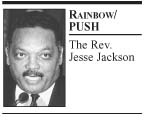 Thousands of New Orleans residents marched on April to demand the right to vote. They marched across the Mississippi River Bridge where Gretna police had repelled residents as they tried to escape the horrors of Hurricane Katrina. Forty years after the passage of the Voting Rights Act, African Americans once more must march to gain the right to vote.
Thousands of New Orleans residents marched on April to demand the right to vote. They marched across the Mississippi River Bridge where Gretna police had repelled residents as they tried to escape the horrors of Hurricane Katrina. Forty years after the passage of the Voting Rights Act, African Americans once more must march to gain the right to vote.
There's an election called for New Orleans on April 22, but the South has always had elections. After centuries of slavery and segregation, the reason for the Voting Rights Act was to defend the right of Blacks to vote. The law requires the federal government clear ahead of time any changes in voting procedures to protect against any trick or scheme that would dilute the voting rights of minorities in those areas of the country with a history of discrimination.
Yet in New Orleans, the letter and the spirit of the Voting Rights Act are being violated. And the rights of New Orleans residents to vote are being trampled. Displaced by Katrina's furies, stranded by FEMA's failures, these citizens are now being betrayed by callous state and federal officials intent on denying them a voice in the future of their city.
New Orleans, once a city of 450,000, now has about 150,000 residents. The rest — disproportionately African Americans, workers and the poor — have been scattered across 49 states in federally arranged relocations. These are citizens whose houses have been destroyed and jobs shut down. Their return to New Orleans has been stymied by federal, state and local officials failing to respond adequately to Katrina's damage.
In place of getting people back to their homes, federal and state officials now seem intent on denying them a vote on those who will represent them.
How is it done? It's brutal and simple: The state of Louisiana and the federal government have refused to set up satellite voting places in states where New Orleans residents are scattered.
The dispersed are told to vote by absentee ballot. They have to write to get a ballot (it won't be supplied to them) sent by mail, and send it back by mail. But many don't know what their address will be next week. And the damage wrought by Katrina means that the mail still doesn't work well.
Even residents in the damaged areas who live in New Orleans will have a hard time voting. The state has certified a range of election places that in fact are destroyed. Officials will change or eliminate those places at the last minute — voters are likely to be both confused about where to vote and find long lines in the places where they can.
And to add insult to the injury, the state of Louisiana has an updated voter list that contains the addresses of all those displaced across the country — but it won't supply the list to the candidates. So candidates don't know where their voters are, and many voters will have no idea who the candidates are.
This looks less like an accident than a design. It will — and it is hard to see anything in it but malign intent — lower the African American vote drastically. This will impact who governs New Orleans and who represents the region in the state, the Congress and the U.S. Senate.
And so like the marchers in Selma 41 years ago, thousands of citizens in New Orleans march for the right to vote. They demand that the election be postponed until September so that the updated voter roll is shared with candidates, satellite voting places are provided in states across the country, voting places in sufficient number are secured throughout New Orleans and that all changes are reviewed and cleared ahead of time to ensure that the Voting Rights Act is enforced.
Katrina's survivors have remarkable spirit. Many have lost their homes, their livelihoods, their neighborhoods.
But they have fought too hard and stayed strong too long to allow officials now to trample their right to vote.
The Rev. Jesse Jackson Sr. is founder and president of the Rainbow/PUSH Coalition.




















































































































































































































































































































